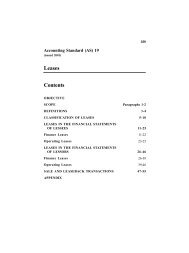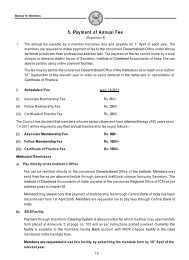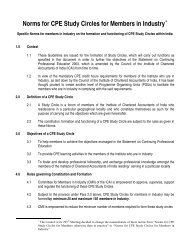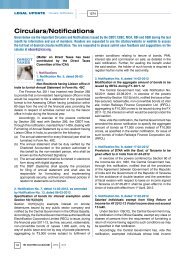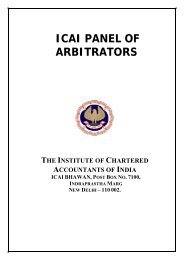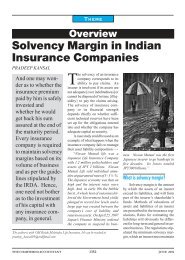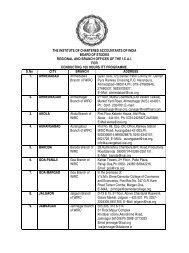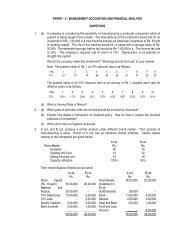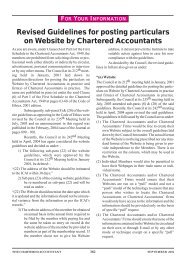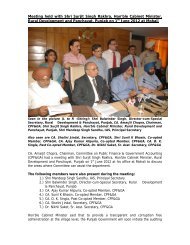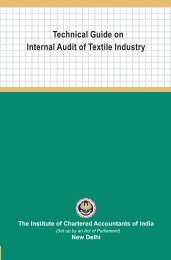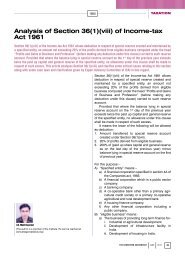The Chartered Accountant
The Chartered Accountant
The Chartered Accountant
Create successful ePaper yourself
Turn your PDF publications into a flip-book with our unique Google optimized e-Paper software.
TAXATION<br />
in its plain sense, it can be seen that it requires<br />
two conditions which have to be satisfied. <strong>The</strong><br />
services which are the source of the income,<br />
that is sought to be taxed, have to be rendered<br />
in India, as well as utilized in India, to be taxable<br />
in India. In the instant case, both these<br />
conditions are not satisfied simultaneously, excluding<br />
that income from the ambit of taxation<br />
in India. Thus, for a non-resident to be<br />
taxed on income for services, such a service<br />
needs to be rendered within India, and has to<br />
be a part of a business or profession carried<br />
on by such person in India. <strong>The</strong> appellant in<br />
the instant case have provided services to persons<br />
resident in India, and though the same<br />
have been used in India, the same have not<br />
been rendered in India.<br />
l Section 9(1)(vii) whereupon reliance has been<br />
placed by the revenue, must be read with section<br />
5, which takes within its purview the territorial<br />
nexus on the basis whereof tax is required<br />
to be levied, namely (a) resident; and<br />
(b) receipt or accrual of income.<br />
l Global income of a resident although is subjected<br />
to tax, global income of a non-resident<br />
may not be. <strong>The</strong> answer to the question would<br />
depend upon the nature of the contract and<br />
the provisions of DTAA.<br />
l What is relevant is receipt or accrual of income,<br />
as would be evident from a plain reading of<br />
section 5(2). <strong>The</strong> legal fiction created although<br />
in a given case may be held to be of wide import,<br />
yet it is trite that the terms of a contract<br />
are required to be construed having regard to<br />
the international covenants and conventions. In<br />
a case of the instant nature, interpretation with<br />
reference to the nexus to tax territories would<br />
also assume significance. Territorial nexus for<br />
the purpose of determining the tax liability is<br />
an internationally accepted principle. An endeavour<br />
should, thus, be made to construe the taxability<br />
of a non-resident in respect of income<br />
derived by it. Having regard to the internationally<br />
accepted principle and DTAA, it may not be<br />
possible to give an extended meaning to the<br />
words ‘income deemed to accrue or arise in India’<br />
as expressed in section 9. Section 9 incorporates<br />
various heads of income on which tax<br />
is sought to be levied by the Republic of India.<br />
Whatever is payable by a resident to a non-resident<br />
by way of fees for technical services, thus,<br />
would not always come within the purview of<br />
section 9(1)(vii). It must have sufficient territorial<br />
nexus with India so as to furnish a basis for<br />
imposition of tax. Whereas a resident would<br />
come within the purview of section 9(1)(vii),<br />
a non-resident would not, as services of a nonresident<br />
to a resident which are utilized in India<br />
may not have much relevance in determining<br />
whether the income of the non-resident accrues<br />
or arises in India. It must have a direct live<br />
link with the services rendered in India. When<br />
such a link is established, the same may again be<br />
subjected to any relief under DTAA. A distinction<br />
may also be made between rendition of<br />
services and utilization thereof.<br />
l <strong>The</strong> provisions of section 9(1) (vii) are plain<br />
and capable of being given a meaning. <strong>The</strong>re,<br />
therefore, may not be any reason not to give<br />
full effect thereto. However, even in relation to<br />
such income, the provisions of article 7 would<br />
be applicable, as services rendered outside India<br />
would have nothing to do with permanent<br />
establishment in India. Thus, if any services<br />
have been rendered by the head office of appellant<br />
outside India, only because they were<br />
connected with permanent establishment,<br />
principle of apportionment shall apply.<br />
l <strong>The</strong> Authority has committed an error in this<br />
behalf. If services rendered by the head office<br />
are considered to be the services rendered by<br />
the permanent establishment, the distinction<br />
between Indian and foreign operations and<br />
the apportionment of the income of the operations<br />
shall stand obliterated.<br />
l It would be contrary to the intent and purport<br />
of the Double Taxation Convention which is<br />
a part of the scheme under the Act.<br />
<strong>The</strong>refore, it is held as under:<br />
Regarding offshore Supply:<br />
l Only such part of income, as is attributable<br />
to the operations carried out in India can be<br />
taxed in India as contemplated in Explanation<br />
1(a) of section 9(1)(i);<br />
l Since all parts of the transaction in question,<br />
i.e., the transfer of property in goods as well<br />
as the payment, were carried out outside the<br />
Indian soil, the transaction could not have<br />
been taxed in India;<br />
THE CHARTERED ACCOUNTANT 993 DECEMBER 2008



